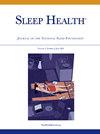青少年性认同与睡眠质量之间的纵向联系:同伴伤害和感知到的社会支持的中介作用。
IF 3.4
2区 医学
Q2 CLINICAL NEUROLOGY
引用次数: 0
摘要
目的:尽管越来越多的证据表明,少数性倾向青少年与异性恋青少年在睡眠质量方面存在差异,但人们对造成这些差异的原因还不甚了解。LGBQ+ 青少年经常会遇到具有挑战性的同伴关系,这可能会对他们的睡眠质量产生负面影响。本研究探讨了性少数群体身份与 12 个月内睡眠质量之间的前瞻性关系,并评估了 6 个月内同伴伤害和社会支持是否对青少年之间的这种关系起到了中介作用:本研究对 800 名青少年(57.5% 为女性;年龄=14.42 岁,SD=0.83)的社区样本数据进行了二次分析。数据是通过为期 12 个月的网络调查收集的,有三个时间点:基线、6 个月和 12 个月:大约 19.4% 的青少年自我认同为 LGBQ+。与异性恋青少年相比,LGBQ+青少年的总体睡眠质量较差,感知到的社会支持较低,同伴伤害和童年伤害较多,并且更有可能是女性(均为 ps 结论:LGBQ+青少年的睡眠质量和感知到的社会支持较低,同伴伤害和童年伤害较多,并且更有可能是女性(均为 ps):这些研究结果表明,性少数群体青少年面临的同伴伤害风险更大,来自同伴的社会支持更少,这导致他们的睡眠质量更差。这些发现可以指导青少年睡眠干预措施的开发,同时改善社交健康和人际关系。本文章由计算机程序翻译,如有差异,请以英文原文为准。
Longitudinal association between adolescent sexual identity and sleep quality: The mediating roles of peer victimization and perceived social support
Objective
Despite growing evidence of disparities in sleep quality between sexual minoritized and heterosexual youth, the reasons for these disparities are not well understood. LGBQ+ adolescents often experience challenging peer relationships, which could negatively impact their sleep quality. The current study examined the prospective relationship between sexual minority status and sleep quality over 12 months and evaluated whether peer victimization and social support at 6 months mediated this relationship among adolescents.
Methods
This study involved a secondary analysis of data from a community sample of 800 adolescents (57.5% female; Mage = 14.42 years, SD = 0.83). Data were collected using web-based surveys over 12 months with three time-points: baseline, 6-, and 12-month.
Results
Approximately 19.4% of adolescents self-identified as LGBQ+. Compared to heterosexual adolescents, LGBQ+ adolescents reported poorer global sleep quality, lower perceived social support, greater peer victimization, childhood victimization, and were more likely to be female (all ps < .001). In a longitudinal, parallel mediation analysis adjusting for baseline age, gender, global sleep quality, and childhood victimization, LGBQ+ adolescents reported higher rates of peer victimization (b = 0.262 [0.049], p < .001) and less social support (b = − 0.385 [0.146], p = .008) at 6 months compared with heterosexual peers, predicting poor global sleep quality (b = 0.495 [0.191], p = .010 for peer victimization and b = − 0.161 [0.068], p = .018 for social support) at 12 months.
Conclusion
These findings highlight that sexual minority adolescents face increased risks of peer victimization and reduced social support from peers, which contribute to poorer sleep quality. The findings may guide the development of adolescent sleep interventions that also improve social health and relationships.
求助全文
通过发布文献求助,成功后即可免费获取论文全文。
去求助
来源期刊

Sleep Health
CLINICAL NEUROLOGY-
CiteScore
6.30
自引率
9.80%
发文量
114
审稿时长
54 days
期刊介绍:
Sleep Health Journal of the National Sleep Foundation is a multidisciplinary journal that explores sleep''s role in population health and elucidates the social science perspective on sleep and health. Aligned with the National Sleep Foundation''s global authoritative, evidence-based voice for sleep health, the journal serves as the foremost publication for manuscripts that advance the sleep health of all members of society.The scope of the journal extends across diverse sleep-related fields, including anthropology, education, health services research, human development, international health, law, mental health, nursing, nutrition, psychology, public health, public policy, fatigue management, transportation, social work, and sociology. The journal welcomes original research articles, review articles, brief reports, special articles, letters to the editor, editorials, and commentaries.
 求助内容:
求助内容: 应助结果提醒方式:
应助结果提醒方式:


